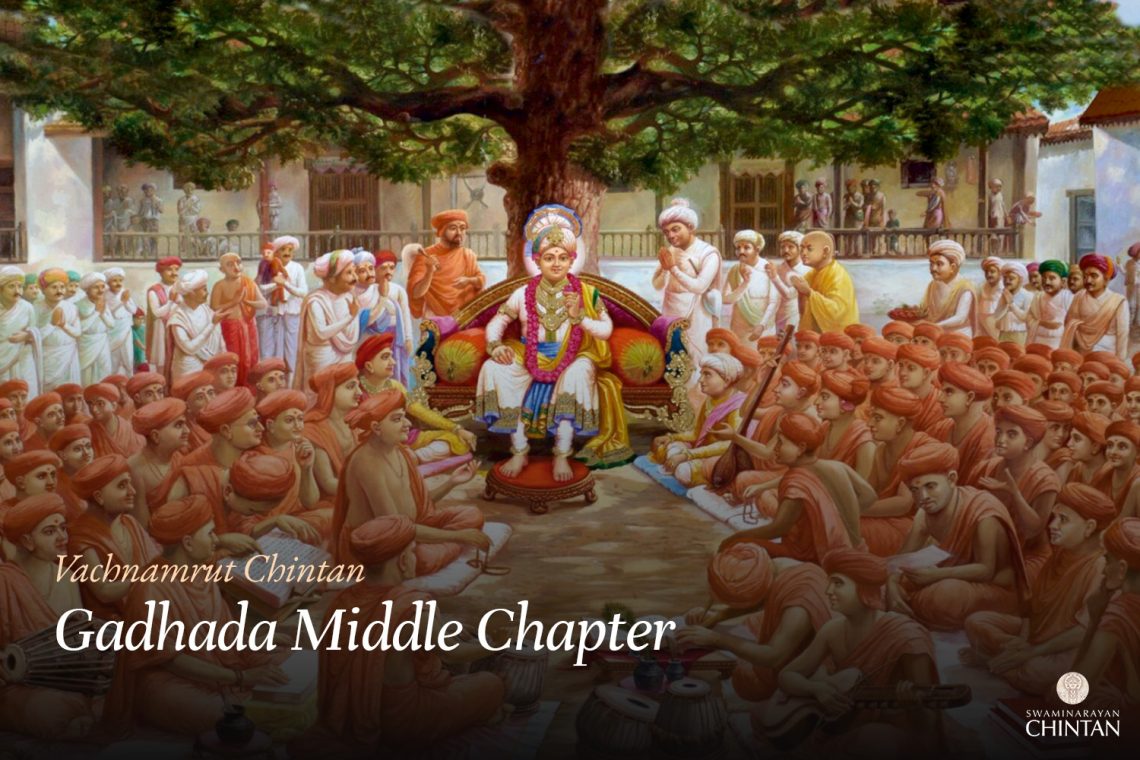Central Insights:
- The Nature of Moh
Key Points:
- Not being able to see one’s own faults is Moh.
Explanation:
In this Vachanamrut, Maharaj defines Moh (infatuation) by explaining that when Moh spreads within one’s heart, a person is unable to perceive their own faults. Therefore, not being able to see one’s own faults is the true form of Moh.
Maharaj also discussed Moh in Vach.G.F.1. There, Muktanand Swami asked, “O Maharaj, what is the form of Moh?” In response, Maharaj stated that Moh appears as a delusion within the mind. When Moh increases in a person’s heart, their mind becomes even more deluded. As a result, they lose the discernment of what should be done and what should not be done.
Maharaj further explains that the cause of Moh is the five sensory pleasures (panchvishay). As long as the mind is drawn to these enticing sensory objects, Moh will not disappear. The Bhagavad Gita also provides much guidance on this matter, as its teachings were delivered specifically to help dispel Arjuna’s—and all souls’—Moh. After listening to the Gita, Arjuna confesses:
नष्टो मोहः स्मृतिर्लब्धा त्वत्प्रसादान्मयाच्युत।
स्थितोऽस्मि गतसन्देहः करिष्ये वचनं तव।।
Naṣṭo mohaḥ smṛtir labdhā tvat-prasādān mayācyuta |
Sthito’smi gata-sandehaḥ kariṣye vacanaṁ tava ||
(Bhagavad Gita 18.73)
My Moh is destroyed, my memory is regained by Your grace, O Achyuta! I am firm, free from doubt, and I will do as You say. (Gita 18.73)
In the beginning, Bhagwan also tells Arjuna, “Where has this delusion come from, in this difficult situation?” Even here, the word “delusion” refers to Moh.
Considering these three references, we see slight variations in the definition of Moh. So, how should we clearly define the form of Moh?
In Vach.G.F.1, Maharaj says Moh is when a delusion arises in the mind.
In the Gita, Moh is described as the inability to decide between duty and non-duty.
Here, Moh is described as being unable to see one’s own faults.
The solution to this is that when discernment (vivek) is impaired, the mind becomes incapable of recognizing the right path forward. This means one is unable to decide on a course of action that will lead to spiritual progress and continued advancement towards liberation. Moh causes confusion. A person cannot decisively choose between two options. This indecisiveness is Moh.
In the three references above, the common point is indecision, but the reasons for this indecision differ. Arjuna’s indecision stems from attachment to his family. In Vach.G.M.1, Maharaj explains that attachment to the enticing panchvishay (five sensory objects) causes confusion. Here, however, the cause is the grip of one’s own ego, which prevents one from making a correct decision. As a result, a person views themselves as superior to great souls and even to Bhagwan. But since they are not truly superior, they cannot actually prove their greatness. This leads to confusion and Moh.
Maharaj explains that every person is excessively proud of their own intelligence. Thus, they find faults even in the Charitras (divine activities) of Bhagwan and in His wisdom, but they are unaware of their own insignificance and pettiness. Such a person should be regarded as wayward, unrighteous, and the king of fools. Bhagwan sees countless universes as mere drops of water in His palm. He is the sustainer of countless universes, the Lord of Lakshmi (the goddess of wealth), and the creator and destroyer of countless universes. Even the Veda (sacred scriptures) describe Bhagwan’s greatness by saying, “Neti-Neti” (not this, not this), acknowledging that His full greatness cannot be comprehended. Yet, a person who finds faults in Bhagwan’s divine Charitras and wisdom must have a powerful ego for it to create such confusion. This is their foolishness. One must also be aware of one’s own insignificance. True knowledge is to understand both one’s own virtues and faults, as well as those of others. When both are recognized, decisions can be made with discernment. If one only sees their own virtues and greatness, it is considered foolishness.
Maharaj concludes by stating that the understanding of Bhagwan and His devotees is extraordinary and otherworldly. Those attached to the body and entangled in the panchvishay of this world cannot fully comprehend them. Due to this foolishness, they develop avgun (faults) and become oppositional.
Glossary
| Moh – Delusion A state where one cannot distinguish between appropriate and inappropriate actions, often caused by attachment. |
| Panchvishay – Five sensory pleasures The objects of the five senses: sound, touch, form, taste, and smell, which cause attachment and delusion. |
| Vivek – Discretion The ability to distinguish between right and wrong, leading to wise decisions. |
| Neti-Neti – “Not this, not this” A term from the Upanishads expressing that Bhagwan’s full greatness is beyond comprehension or description. |
| Charitra – Divine activities of Bhagwan |
| Ego – Self-Respect & Self- Importance |
| Avgun – Faults or flaws |
| Sushupti – Deep sleep The state of unconsciousness or deep sleep, where the mind is not active, and the individual does not experience desires. |
| Rajogun – Mode of passion The quality associated with activity, desire, and attachment. |
| Achyuta – The imperishable one |
| Atmasatta – Living as the soul, distinct from the body A state where one’s behavior aligns with the understanding of oneself as the eternal, spiritual soul. |

